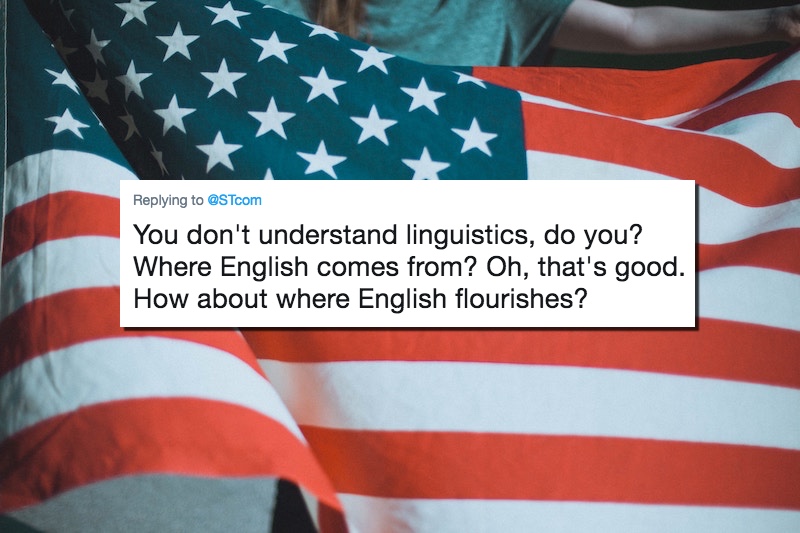EDIT: Alas, good ol’ Don has either taken down his Twitter account or made it private. You’ll just have to make do with some screengrabs and old Twitter embeds.
Before we begin this story proper, let us sing the song of ‘Murica. Not the United States, mind you, but ‘MURICA.

Meet The Straits Times. Singapore’s biggest English-language broadsheet newspaper, and the country’s highest-selling one. It’s a publication that has won numerous awards (if you count its parent company conferring themselves prizes), and one that’s often labelled as way too tight with the ruling government.

And then meet Don Lovell, a self-proclaimed counselor, consultant and curmudgeon from Atlanta, Georgia, in the good ol’ US of A.

Today, they butted heads over the vernacular differences between American and British English, and oh, what a wonderfully unnecessary debate it was. Admittedly, Coconuts uses American English across all its regional network, but Lovell here just doesn’t get the point that historically, and intentionally, ST has always used British English — and they’re not about to change it because a man thinks his English is the only English standard.
Anyway, on to the kerfuffle. Earlier this afternoon, the Singaporean publication tweeted out a report about a driver who was arrested in an alleged drunk, errrr “drink” driving case.
Car crashes into tree along Braddell Road, driver arrested for suspected drink driving https://t.co/1V5NSYO7SZ pic.twitter.com/ig11B8E27q
— The Straits Times (@STcom) September 29, 2017
Annoyed by the usage of British standards, good ‘ol Lovell insisted that the phrase that should have been used was “drunk driving”.

ST responded curtly with a screen grab of the Cambridge dictionary. Nothing else needed to be said.
https://t.co/quJHfUv1eC pic.twitter.com/msicreP8vz
— The Straits Times (@STcom) September 29, 2017
Not to be outdone by a damn dictionary definition, Lovell said that ST — a newspaper that’s been around since 1845 during the British colonial rule with a British man as its founding editor — should actually be using American English instead.

Though they didn’t need to entertain the American at all, ST schooled him on the origins of the English language.
We use British English. Where English comes from. Thanks and have a good day.
— The Straits Times (@STcom) September 29, 2017
Lovell then questioned the paper’s understanding of linguistics. A sincere query posed to an entity that’s been around since before he was even born.
“You don’t understand linguistics, do you? Where English comes from? Oh, that’s good. How about where English flourishes?”
Dude just doesn’t give up, continuing to insist that he’s in no way incorrect with tweets that include:
- “I have an idea. From now on, translate @STcom posts into each of the 6,500 spoken languages used on the planet today. Problem solved. “
- “It seems as though you do not care to embrace the diversity that this planet gives life to. It this a new kind of discrimination against us?”
- “So you think that they only want UK et al. readers? I’m in the US, and I follow them. Translation efficacy matters.”
- “Improper tense of the language retards the communication between our nation states.”
In the face of pure ignorance, the internet could not resist having a go at the man.
— Ivan (@kaeizr) September 29, 2017
Think you’ve misunderstood some things
1 That your opinion has any merit
2 That the target audience for this paper is Americans (It’s not)— Pastles Lives Here (@pastles_live) September 29, 2017
Flourishes? From the country that brought the world “Cash me outside, how bout dah?”.
Okay, cool, let’s go with that.— 赤根隼人 @LLSS LV 30/8 (@akanehayato) September 29, 2017
How about you just use google translate if you can’t figure out British English?
— sharan kaur (@sharanvkaur) September 29, 2017
A Singaporean newspaper’s primary concern is its Singaporean audience. Not everything in the world has to be about you, you know. 🙄
— Visakan Veerasamy (@visakanv) September 29, 2017




